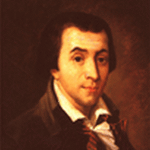 Jacques Brissot (1754-1793) was the figurehead and de facto leader of the Girondinist bloc which dominated France’s government in 1792-93. Born in Chartres, Brissot was the 13th son of an innkeeper but nevertheless managed to receive a good education. The teenage Brissot showed some interest in becoming a lawyer, taking up employment at a Paris legal firm. By adulthood, however, Brissot was more interested in writing, following a course previously charted by the likes of Voltaire and Rousseau. In the 1780s Brissot toured England, in part to undertake studies of its political system and social classes. His written comparisons, which were critical of France and favourable towards Britain, were not well received back home; on his return he was imprisoned briefly in the Bastille. In 1788 Brissot became a foundation member of an abolitionist society seeking an end to slavery in the colonies. In May 1789 he founded a newspaper, Le Patriote Francais, which later served as the main organ for the Girondins. An outstanding public speaker, Brissot was chosen as a deputy to both the Legislative Assembly and the National Convention. The radicalism of August 1792 prompted a split between Brissot and his followers, and members of the Jacobin movement. In 1793 he launched stinging attacks against the Jacobins, the Paris Commune, the city’s sections and radical journalists, claiming they were divisive and anarchistic. Brissot was arrested in June 1793 and guillotined five months later.
Jacques Brissot (1754-1793) was the figurehead and de facto leader of the Girondinist bloc which dominated France’s government in 1792-93. Born in Chartres, Brissot was the 13th son of an innkeeper but nevertheless managed to receive a good education. The teenage Brissot showed some interest in becoming a lawyer, taking up employment at a Paris legal firm. By adulthood, however, Brissot was more interested in writing, following a course previously charted by the likes of Voltaire and Rousseau. In the 1780s Brissot toured England, in part to undertake studies of its political system and social classes. His written comparisons, which were critical of France and favourable towards Britain, were not well received back home; on his return he was imprisoned briefly in the Bastille. In 1788 Brissot became a foundation member of an abolitionist society seeking an end to slavery in the colonies. In May 1789 he founded a newspaper, Le Patriote Francais, which later served as the main organ for the Girondins. An outstanding public speaker, Brissot was chosen as a deputy to both the Legislative Assembly and the National Convention. The radicalism of August 1792 prompted a split between Brissot and his followers, and members of the Jacobin movement. In 1793 he launched stinging attacks against the Jacobins, the Paris Commune, the city’s sections and radical journalists, claiming they were divisive and anarchistic. Brissot was arrested in June 1793 and guillotined five months later.
Information and resources on this page are © Alpha History 2018. Content on this page may not be copied, republished or redistributed without the express permission of Alpha History. For more information please refer to our Terms of Use.
